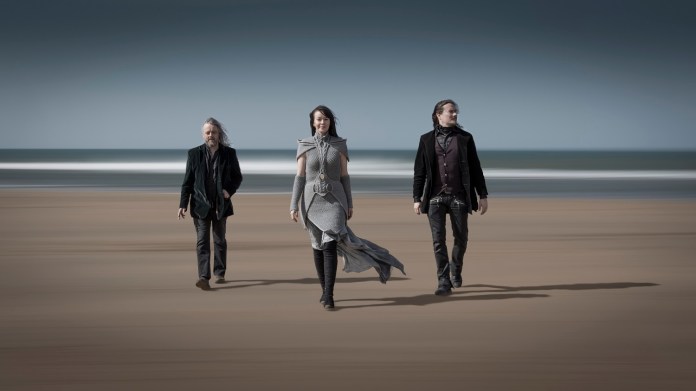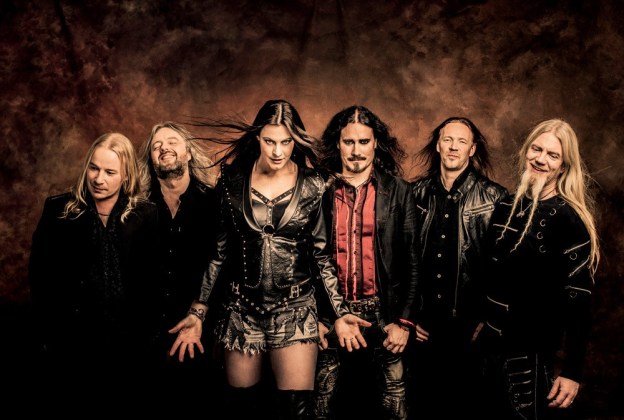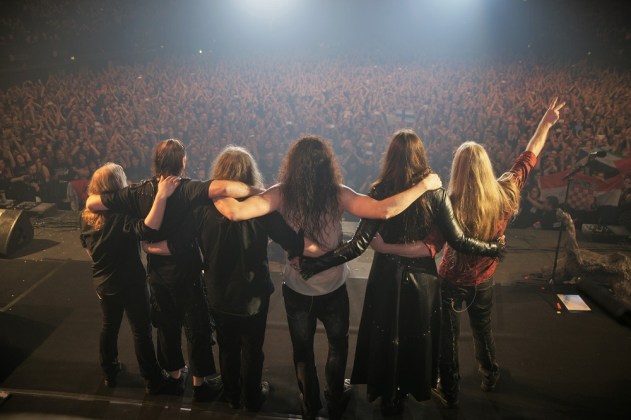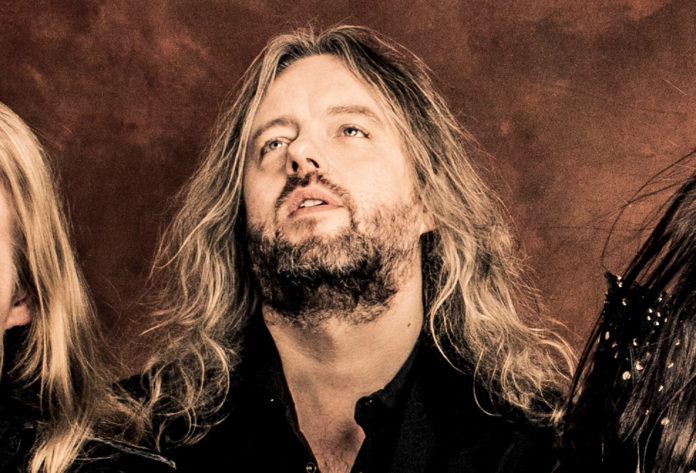
Metal Blast: The first, and perhaps most obvious question, is simply “Why?”. Considering how busy you and Tuomas are with Nightwish, why did the need arose to create something like Auri?
Troy: We had to! We are three friends, we share a lot of time with each other, and we share the same tastes in lots of things, whether it’s literature, film or music. We have a very similar attitude towards life, and we had always wanted to somehow distill the way we feel into music, into a project where the three of us could work together and write together. That was the real motivation.
Going to the root of it, both Tuomas and I were huge admirers of Johanna‘s voice, and we kind of saw it as a quest to have that voice in our world, in our music; to be able to write music for that voice. Auri was a good way to get Johanna‘s voice out of Finland, because she’s an established artist in Finland, but nowhere else. She really fired this project. I played in her album back in 2010, where I did a guest appearance and Tuomas wrote a song for her. We were all in this “mutual admiration society” so, of course, we decided that, as soon as we could, we would do this. It wasn’t even called Auri at the time, it was only an idea, and we were driven to do it with the time that we found available.
MB: Just a couple of days ago I was speaking with another musician about how his name has sometimes been a hindrance to him, because it is immediately associated (and perhaps even typecast) with a certain band, a certain sound, etc. Is that ever a concern for something like Auri?
Troy: That is actually one of the milestones when you’re popular in any particular genre. If you become a face and a name in a genre, you’re expected to do certain things, it’s a weight that you’re supposed to just carry around you, and it’s very difficult to escape from it.
There will always be expectations from fans, thinking that we only do Nightwish. It’s a fairly reasonable presumption, sure, but when it came to Auri we did it more freeform; we did it more for ourselves, creating something that would satisfy our musical needs to hear this kind of thing. To work together on something that was, first of all, honest to ourselves and, second, completely outside of any genre, not built for any particular genre, whether it’s metal, rock, folk or anything. We genuinely tried to write about our feelings about atmosphere, structure and thorns… all the delicious things that are part of making music.
There will always be pre-conceived ideas about it, and there will be some degree of shock for some Nightwish fans but, at the same time, in our recent press junket around Europe we did around 62 interviews in 4 days, and it really dawned on us that metal fans are the most open-minded fans on earth. We can expect, in general, a pretty open-minded response. Of course, you’ll always get the snobs who’ll hate it, but we didn’t make it for them.
MB: Since this year you’ll embark on the “Decades” Tour, I guess the chances of taking Auri on the road are pretty slim… unless you’re planning to open for Nightwish.
Troy: [Laughs] I can see the fun in it, I can see the attraction in doing that, but I don’t think it would work for us. Still, we do intend to perform this music live, but we need another album under our belt to do so. Luckily for us Nuclear Blast has a 2-album deal with us, We will do another album and tour it with Auri, but we’re looking at 2022 for it… which is crazy, of course. The thing is, Nightwish is a heavy beast, and it demands a lot of attention and commitment, so we’ve to wait for the next 4 years.

MB: I think that a lot of people believe that, since you’re getting paid to play music, you kind of live a freeform, schedule-free lifestyle, so it’s always interesting to get a closer look into how much planning actually goes into a professional band.
Troy: Spot on, that’s what it is. And that’s the position we found ourselves in, but it’s a wonderful position. We’ve been rehearsing all of last week for the Nightwish tour, it’s sounding glorious, we’re really excited. The Auri tap has been closed for a while now, and will remain closed, but we will open it up again for 2022. We’ve even have a plan! We want to do a tour of castles and cathedrals in 2022!
MB: Going back about the issue of being “typecast” into a certain genre because of the bands you’ve worked with before… once Auri does go on tour, you know that places like Wacken, Hellfest, Download, etc., are going to call. They’re great places, sure, but maybe not exactly where you’d find a truly interested audience in the kind of project you’re putting out
Troy: What we hope is going to happen is that all the sympathetic Nightwish fans will understand what we’re doing. It’s music, after all, and it goes to this idea that metal fans are really the most open-minded out there.
Auri is a little stream that breaks away from river, and we’re hoping that as this little stream meanders, it picks up a whole new world of people. People who don’t know what Wacken is, who don’t know Nightwish, etc. We’re hoping that it will open out a bit more doors. We could never do castles and cathedrals with Nightwish (well, maybe castles, but not cathedrals!); with Aury, however, we could. The possibilities are really exciting, but they’re all getting frozen for 4 years. It’s a peculiar feeling, a really strange one, since we know that we did this thing, but that we cannot do it again for 4 years.
MB: It seems like such a strange thing to me. You make this album, it comes out on March 23, while you’re on tour with Nightwish in North America… and so you just have to shelf the whole thing.
Troy: It’s mental! And it’s really frustrating for us that we’re actually in America the day that the Auri album comes out. There’s nothing we can really do; it’s a shame that we couldn’t do something special to mark that auspicious day.

MB: I’m sorry if this is a silly question but… would it be impossible to just bring Johanna on stage for that show a do a single Auri song? Do the logistics of the concert just make it impractical?
Troy: Unfortunately, yes. We’ve never thought of doing such a thing because once the Nightwish juggernaut starts rolling it’s just unstoppable, and you have to throw yourself into it 100%. If you divert from it, it can only cause problems. You really have to become part of this big ship, part of its makeup.
This coming Nightwish tour is a big one, and we’ve gone up a few steps in production as well, which makes it difficult to just insert something like Auri into it. We just have to bite the bullet and let it freeze for a few years… although, at the same time, we can’t wait to get out on the road on the good ship of Nightwish anyway!
MB: How much liberty do you have on a given set? I mean, the way in which the concert ends up happening, how everyone interacts with each other, how much liberty does every member have there, or is it really coordinated like some sort of ballet?
Troy: It’s very much coordinated…. It’s not so much scripted, but it’s very much set in its structure. It has to be! There are so many parts moving in it, all at the same time, that it has to operate like a ballet. There’s no much space for left-of-field improvisation or anything like that; plus, we’re all locked into time on stage, as in we’ve got a clicktrack going, so we’re all tied to the orchestral backing tracks. We have to all be synchronized and know what everyone is doing. I personally really like to improvise, it’s really in my roots, and I do get a chance to improvise a bit but, on the whole, everything there is carefully planned.
MB: Aware of the fact that, as Zappa said, speaking about music is like dancing about architecture, how can you describe the Auri project?
Troy: If you listen to the two singles that came out, they’re not that similar to each other. That was the record company’s decision, they wanted it to be different, they wanted each single to be different, and the third single, which will come out on the day of release, will also be different, completely different. At the same time, they’re all pieces. There are 11 pieces in the album, they’re all held together and make sense. Not conceptually, it’s not a concept album at all (unless you call it an “atmospheric” concept), but from the beginning, from “Space Between,” which opens the album. That one really was a no-brainer as an opener because it felt like some sort of launchpad into the Auri world.
I hate to use the cliché of “a journey through music,” because it absolutely sounds like crap, but the album is definitely some sort of voyage. The ups and downs are meticulously crafted, and when you listen to the whole album at once, as one big experience, it makes a lot more sense than singles. I’ve never been one for singles, I think the last time I ever bought one was when I bought Ozzy Osbourne’s Crazy Train!
On the whole, this album is an experience; it goes through all kinds of colors, all kinds of environments. It’s got all kinds of mysterious instrumentations, different velocity curves… it’s quite a trip. It’s hard to describe though, you really gotta hear it.

MB: This conversation about the label picking these two singles reminds me of a conversation I had with Marco Hietala a few years ago when Endless Forms Most Beautiful was being released, where he mentioned how things like studio updates, lyric videos, etc., were all kind of strange for him. Of course, it’s an understandable activity, since you need to create buzz and retain the attention of a generation of fans who, due to so much availability of content, have very short attention spans to begin with. Do you feel that this participation of the industry represents a challenge for the artistic part of what you do? Knowing that there are these commercial and industrial considerations that simply shape the way in which the business is to be conducted now.
Troy: I’m fully aware of that, and we were very indifferent to it. We were of the opinion that whatever they wanted to put out, they could put out. We didn’t mind, we were happy with whatever was done. Still, with Auri, we made the conscious decision to not give too much of ourselves. Now, we’ve done a lot of interviews, but there aren’t a lot of photographs out there. There are a few video interviews, but we’ve tried to play our cards to our chest a bit more; we didn’t go into details on any of the songs, stuff like that. Not much on inspiration either, because we believe it’s important that the listener has his own experience. We haven’t done exclusive photo-shoots with magazines, they’ve only got a handful of photos that they can use.
We haven’t had a backlash about it, but we’ve definitely had a number of people asking why we didn’t want to do this or that, create a Facebook page for Auri, do more updates, etc. It’s saturated, and we wanted to go back, even if a little bit, to create some sort of enigma. Make it so that the music speaks volumes rather than us.
What you’ve touched upon, however, is something that I’m really interested in in regards to how, in the future, people will listen to music; the attention span, the way in which the internet has changed people’s attitude towards music, musicians and the artform. How people now use music as a commodity, and don’t even intend to pay for it. All those things that are a threat to bands and solo artists.
Also, on a more esoteric level, they mystery is gone. The constant updates all the time… When I was a kidit was a massive anticipation to wait for the next album. There were no news, there was nothing. There were rumours, but there was nothing else, and it was a beautiful mystery to the world back then. It’s been lost now. They call it progress, but I wouldn’t necessarily call it that. The way to try to counteract this is to dial it back a bit with your attitude towards it.
I’ve always loved Pink Floyd, I remember that when The Wall came out there was nothing! You never saw the band. They had a number 1 single with “Another Brick in the Wall,” but they weren’t even in the video (which I really liked). At the time they were mysterious figures, they were like Olympians. It was the same with Led Zepellin; they’d never let their music be used for adverts and stuff like that. Everything seemed a bit more precious and unattainable. It had to be discovered and experienced personally.·
MB: I know a musician who’s in a fairly major band, whose social media personality is all about showing cars, women, money, etc., even though that’s not really the kind of behavior that he demonstrates in person. And it’s basically because that’s how the business expects him to be right now, that’s the image that needs to be sold.
Troy: That’s really the definition of selling out. Personally I couldn’t bear to do anything like that. Plus, I’m not ostentatious at all in anything. I would never be caught flaunting anything.
MB: I take it you don’t often show off your collection of Ferraris then?
Troy: [laughs] My Rolls Royce silver ghost… I do sometimes drive it down the main street while wearing my crown. Then again, if you’ve got a crown you have to wear it.
The three of us are uncomfortable with all of that. I think we share the same opinion on the way social media, as glorious as it is, is a dangerous place full of strange creatures that speculate. It’s full of poison and nastiness. At the same time, I’m an optimist, I see the good in people.

MB: Speaking of poison, after our last interview….
Troy: It was such a brilliant interview! And it got a fantastic response.
MB: True but, at the same time, part of the response dealt a lot with people blaming you from “converting” Tuomas into atheism. People argued about the issue based on, in reality, just guesstimates.
Troy: It’s completely shallow and completely wrong! That’s an insult to Tuomas, since it means that he’s a complete weakling who doesn’t have a mind of his own, which couldn’t further from the truth.
All you can do is be with your friends and talk. If you go and talk to your friends about how you like a certain type of drink, if they start drinking it does it mean that you’ve “influenced” them in a negative way?
MB: It even goes beyond that. Regardless of how smart a person is, most of his or her ideas didn’t just magically come “from within.” They read them somewhere, they learned about them in some way, and they made them part of their identities.
Troy: We’re all products of influence. There are a lot of cretins out there; a lot of nasty, bitter snobs. Nightwish snobs. They’re cretins and morons.
MB: In my conversations with Anette Olzon and Floor Jansen it was always shocking to see the hatred and vitriol that they themselves would suffer as a result of replacing the previous singer.
Troy: I can’t even go there. Tuomas says that it’s like a sore tooth, it’s unavoidable. It’s so fascinating in its awfulness. These people, who still call themselves “fans,” are the most vitriolic, the ones who say the most nasty things about Floor. If I was a different kind of man, I’d be really annoyed and angry at some of the things that I’ve read about Floor, but they give it to us all as well. There are people out there who hate Tuomas and think he is shit, and other who hate me because I’ve influenced Tuomas. That he’d still be a Christian if it wasn’t for me or some shit like that.
MB: At same time, we’re both older, we can look at the people posting this and realize that these kids (assuming they’re kids) are not OK. I don’t even mean that as a joke; the kids who, after Tarja left, cried, sent death threats, etc…. they’re definitely not well in the head.
Troy: Absolutely. But this is the problem with social media, the anonymity of it. They can spew their terrible, nasty thoughts with completely impunity and immunity. It’s very cowardly. I see people slagging people off on the internet; people sitting in their bedrooms tapping away their dull lives on their laptops, spewing this terrible stuff. It’s just really tragic. It’s a desolate thing.
The world of social media has amplified it and made it worse. What really feeds into what we’re talking about here is the Andy Warhol “famous for 15 minutes” idea. You’ve got all of these people who are belching this bile thinking that their opinion is meaningful, that they have something to say that will have some kind of importance and effect. Unfortunately some people are susceptible to that and it does affect them.
MB: Part of it deals with the revenue model of the internet. You make money from ads, which pay once a person enters the site. You need clickbait content, you need low brow, crazy shit on your site, to ensure that you get those clicks, you get those impressions, and you get the money.
Troy: You’re absolutely right, and it’s an important point. The difference here is that you’re a journalist, whereas most of these hapless laptop tappers who comment on Youtube, forums, etc., they’re just people spewing vitriol.
MB: To be honest though, you often won’t see the difference. At the level of music journalism, the inmates have taken over the asylum.
Troy: Absolutely. And you’ve got to be pretty thick skinned. It’s a time vampire. I haven’t got the time to go and read people I’ve never met slagging anybody off. I don’t have any compulsion at all with that whatsoever. Complaining about the press is like sea captain complaining about the sea. It comes with the territory.
I don’t think that it’s healthy for people to be constantly available all the time on chat rooms, on youtube, etc., constantly commenting on their own particular hates.
MB: You know, we have this tiny Youtube channel where, from time to time, we upload content. Although the reception has usually been great, and even though we haven’t uploaded anything in close to a year, we still get the occasional “GO FUCK YOURSELF YOU PIECE OF SHIT!!!!!” [laughs]. Just completely random strangers who, in an apparent outburst, just decided to hurl insults. It’s fascinating
Troy: [Laughs] Of course, we get that shit all the time, but you’ve got to just remember Jesus Christ: “Forgive them, for they not know what they do” [laughs], They’re in a strange kind of echo chamber, that weird vacuum that is social media and, again, I think it’s the Andy Warhol effect, just much worse. They truly believe that their opinions are important, and it’s tragic.
I saw an article on the newspaper the other day that there’s a really popular t-shirt out there that a lot kids are started to wear, and it filled me with hope, since it’s a nice antidote against these “trolls”: It says “No, I’m not on fucking Facebook.” It’s brilliant! Kids are wearing it! There was a kid wearing it at the York rail station the other day, and I think that there’s hope. Kids are starting to think that there must be something more in life than gazing at a black mirror.
MB: Before we finish this free-form interview…. I want to ask you about Decades, Nightwish’s new compilation album. I think it’s interesting that it opens with The Greatest Show on Earth, Tuomas’ opus to evolution and secularism, but still manages to include The Carpenter, a Christian song. It can’t be a coincidence that we get to see these two snapshots of not only Tuomas’ changes as a musician, but also as a Christian-turned-secular. It’s interesting, especially when you consider that songs that were even more popular from those early days, like Beauty and the Beast or Wishmaster, were left out.
Troy: You said it. It’s a snapshot from the past. We all felt that it was important that every part of the band was represented, not necessarily from a chronological standpoint, but in regards to the ideas behind them. Look at a song like Elvenpath, for example. It’s a really naive song; the Carpenter, sure enough, is obviously a Christian song, but it reflected the way he was back then.
The splendid thing about old Tuomas is that he really is at peace with himself. He doesn’t have any problems with that kind of stuff. I think that we all think that it’s a bit quaint, it’s part of the history of the band.
I think that The Carpenter could be just brushed under the carpet because it’s kind of ambiguous about whether or not it’s Christian but [laughs] actually not at all.
MB: Well… I think that their music video for the song, way back when, actually uses Christian iconography.
Troy: There’s no doubt that it’s definitely a Christian song…but I think that it still fits in with the whole idea of Decades, and the retrospective nature of this tour. All the songs, warts and all. We have regenerated a lot of these songs for this tour, so there’s a lot of color being added to rejuvenate some of the old songs. Like The Carpenter, for instance, has been rejuvenated…guess who’s singing The Carpenter?
MB: You?!
Troy: [laughs]
MB: Having said that… I mean, it’s philosophically interesting that you’re singing it, but I think I know why Tuomas isn’t singing it [laughs] Troy: The reason why Tuomas isn’t singing it is because he couldn’t really sing it in the first place! [laughs]
MB: I am well aware of this!
Troy: [Laughs] By his own absolute admission his singing on that album is not very good.
Of course, you know me… singing “The Carpenter” feels quaint to me, and it feels quaint because I have no problem singing like” All things bright and beautiful, All creatures great and small, All things wise and wonderful, The Lord God made them all.” I have no problem singing hymns. I was a Christening yesterday! A friend of mine was getting his baby Christened… a preposterous thing for me, but there I was. I was there for my friend.
MB: A bit of selling out just for a free lunch.
Troy: [laughs] That’s the only reason I went! You’ve read my mind. It was just so that I could get the free vegetarian sausage rolls after the gig [laughs]. I mean, it was kind of like a gig.
MB: And this new role singing with the band on tour… is this a new thing for you? Because I’ve seen Nightwish before, with you on the band, and you’re usually doing backing vocals, instead of going center stage.
Troy: They’ve demanded that I sing.
MB: “They opened my cage and said ‘ you will sing now, troy!” [Laughs]
Troy: [laughs] Well, I’ve sang the introduction to “My Walden,” for example, in Endless Fors Most Beautiful, and we’ve dabbled with backing vocals in the past. Now, you’ll find that on this Decades tour there are a lot more backing vocals. We’ve gone seriously into harmony vocals, which is really a delight. It really transformed songs like “Come Cover Me,” which we sing in a 3-part harmony. Also, I’m playing harmony guitars to Emppu, which is a nice development, since I can now fill out the underground while he soloes on the top with rhythm and things like that.
And, in any case, I was doomed, there was no way out of singing “The Carpenter.” It was like “you’ve got to sing this song”, I was like “….but I can’t!,” and they kept asking until I did. And, honestly, it really works.
MB: I’m really looking forward to seeing it live, because this album includes a lot of songs (like “Elvenpath” and “The Carpenter”) that I’ve never seen live. Especially something like “The Carpenter,” where the original vocals… let’s just say weren’t great.
Troy: [Laughs] You’ve gotta give the poor guy a bit of slack. Poor old Tuomas, back in those days, really had no choice. He was up against it and took it upon himself to do it even though he really didn’t want to do it. You’ve gotta understand that nobody understands this more than him. He knows. The wonderful thing about him is that he has a wonderful sense of humor, so he’s completely OK with all of that.
We’re exploring new things, going down new avenues. With the vocals, the twin guitars, etc. And in “The Carpenter” I get to sing a duet with Floor, and it really doesn’t get any better than that.


